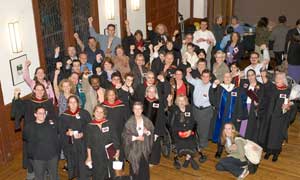Berkeley commencement supports Mumia
By
Brenda Ryan
Published May 23, 2007 11:56 PM
Leslie Feinberg, who has spent her life fighting for justice for workers and
oppressed people and helping to create a modern transgender movement, received
an honorary doctorate from the Starr King School for the Ministry.
|
Some of those who wore Mumia stickers
at commencement.
Photo: Steve Fisch
|
The school, part of the Graduate Theological Union in Berkeley, awarded
Feinberg with a letter of humanities doctorate at its commencement ceremonies
on May 17. The doctoral diploma recognizes Feinberg as “a champion of
justice for all people, organizer, activist, author and historian, who works
tirelessly on behalf of workers, the poor, those imprisoned for their beliefs
and the transgender community.”
“Merging theory with practice, hir work is an example of solidarity
across differences and in the intersections of oppressions,” the diploma
states, using gender-neutral pronouns. “Despite risks to hir personal
safety and reputation, ze continues to write, speak and demonstrate hir
commitment to countering oppressions and building organizations that insist
that in our nation and communities, liberty and justice must truly be for
all.
“By speaking when others were silent, honoring the stories of people who
struggle to survive and working to bring them together, ze provides an example
of life lived in service to the common good.”
Feinberg is renowned for helping to establish language to help understand and
fight oppression based on gender and sex and for her books documenting the
roots of that oppression. She is a long-time member of Workers World Party and
a managing editor of Workers World newspaper.
Feinberg spoke openly as a communist at Star King’s commencement dinner
on May 16. She said, “I think what brought us together here tonight is
that we each sincerely want to change the world for the better. We may or may
not agree on how. But we can meet by bridging conscience and
consciousness.”
Feinberg told those gathered that Marx’s phrase that religion is the
“opium of the people” is usually quoted out of context. “Marx
was actually writing with great compassion for the suffering of the class that
was, and still is, exploited, downtrodden and disenfranchised. Marx wrote,
‘Religious suffering is, at one and the same time, the expression of real
suffering and a protest against real suffering.’ Religion, he explained,
‘is the sigh of the oppressed,’ it is, ‘the heart of a
heartless world, and the soul of soulless conditions.’ It was in that
context that Marx said religion is an opiate for pain and suffering.
“Many of us in this room share this in common—we feel that
suffering, hear the sighs and moans around us, struggle to change the soulless
conditions. How can we unite to change those conditions?”
Feinberg noted that the following day people around the world would be in
Philadelphia to support political prisoner Mumia Abu-Jamal at a court hearing
to consider his petition for a new trial. Feinberg, who was wearing a sticker
reading “New trial now! Free Mumia!” encouraged people to take
these stickers and wear them in solidarity at the commencement ceremony the
next day.
“The struggle to free Mumia is a defining case of our era, like the
struggle to free the Scottsboro Brothers and the Rosenbergs,” Feinberg
said. “It is part and parcel of the fight against racism and national
oppression, against the prison industrial complex and the death penalty, used
as a weapon by today’s rulers just as the emperors lined the road to Rome
with crucified slaves to warn others against trying to rise up to break their
shackles.
“We are modern-day abolitionists, who are organizing to end this system
of capitalist economic enslavement and build a society in which each individual
can contribute what they can and in return, receive all that they need and
desire,” Feinberg concluded. “So I leave you with this question:
Which side are you on?”
The audience responded by giving Feinberg an enthusiastic standing ovation.
At commencement the following day virtually every graduating student was
wearing the Mumia sticker, as well as the president of the seminary, kitchen
staff and ushers, who also handed out the stickers.
Mumia was the theme of Feinberg’s commencement address. “I raise my
voice here for all those the government is trying to silence,” she
declared. “I raise my voice to demand ‘Free Mumia Abu-Jamal’
so loudly that I hope this Black revolutionary journalist can hear me from his
death-row cell in Pennsylvania.”
Feinberg also spoke out for American Indian Movement warrior Leonard Peltier
and the Cuban 5, the peoples of the Middle East and Central Asia, Africa and
Latin America, who are fighting for their right to self-determination and
sovereignty, for undocumented immigrants, for Muslim, Arab and South Asian
immigrants, and for those in the Black movement demanding reparations from
slavery and the right of Katrina survivors to return to their homes.
The crowd again gave Feinberg a standing ovation. And after the reception that
followed, a group of about 45 of the students, faculty, staff, alumni and
trustees, including the president of the seminary, who had worn “Free
Mumia” stickers on their gowns, gathered for a photograph to send to
Mumia to show their support.
Mumia has been at the center of a commencement address before. In 2000, the
Antioch College graduating class voted Mumia and Feinberg as their joint
commencement speakers. The Fraternal Order of Police and the Klan fought the
decision but the students prevailed.
The reception by the Star King School was another victory, Feinberg noted.
“It’s a sign of the deepening and widening understanding of how
critical the need for solidarity is to build a powerful movement to transform
economic and social life.”
Articles copyright 1995-2012 Workers World.
Verbatim copying and distribution of this entire article is permitted in any medium without royalty provided this notice is preserved.
Workers World, 55 W. 17 St., NY, NY 10011
Email:
[email protected]
Subscribe
[email protected]
Support independent news
DONATE


